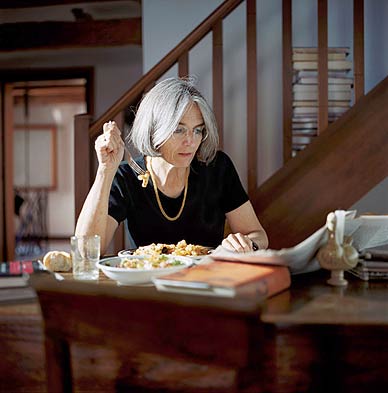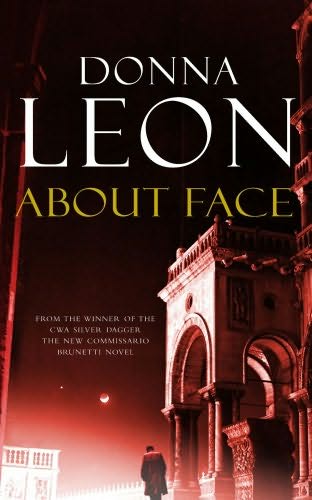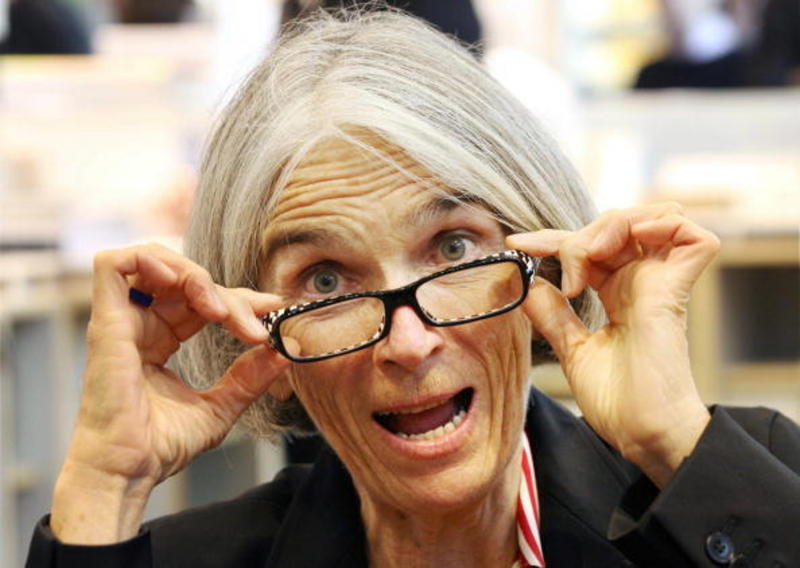
It’s no secret that I’m a Venetophile or that I have a mild addiction to all things Venice. Therefore it should come as no surprise that I trooped along to Daunt Books when I heard that bestselling crime writer, Donna Leon would be speaking there as part of their evening talks programme. So what if I had pre-booked three tickets in a rush of enthusiasm, believing I would be accompanied, only to find myself quite unexpectedly on my own? A girl behind me in the queue was very grateful for my abandonment, swiftly buying one of my spare tickets as the talk had been yet another Daunt sell-out, so I wasn’t very much out of pocket at the end of the day. It would seem I wasn’t the only one keen to see the famed Venetian crime writer and creator of the keen-eyed and affable Commissario Brunetti.
When Venice-based but American-born Donna Leon appeared on stage she was petite with a neat bob of grey hair and a tanned face that spoke of life in places warmer than London. It was hard to believe she was sixty-seven, such was her energy and spriteliness. Linking herself to the venue, Leon began by recounting her first visit to Daunt, when she didn’t realise that the bookstore had a travel specialism, causing her to ask an assistant why her books were in the section devoted to Italy. Then she moved on to explain some of the background to her current release, About Face.

The title should give us a clue – the emphasis placed by Italians on la Bella Figura, or good appearance is key to the plot. Leon explained that there is a strange phenomenon in image-conscious Italy, called La Superliftata. This is a woman who has undergone plastic surgery or ‘liftings’ on a number of occasions, so that she may come to resemble a Bride of Wildenstein-in-training. In fact, it is such a person once spied by Leon at the opera who inspired one of the characters in About Face.
The Mafia also raises its head in Leon’s latest; with particular reference to their involvement in the business of rubbish disposal . Leon told the aghast audience that the Italian government is burning toxic waste from the North of Italy and Germany without filtering it and the pollutant effects are visible to all. For instance, in Taranto, where the true Mozzarella di Buffala is produced, the sheep are thin and sick with toxicity. Poisonous waste is being burned in their immediate vicinity, great plumes of smoke evident on the horizon and suddenly a creamy ball of true Buffalo Mozzarella doesn’t seem quite as appetising as it might have been prior to this disturbing revelation. According to Leon, in Italy such scandals flare up, cause an outcry and are then relegated to the ranks of Il Domenticatore, a virtual or imaginary place where such things are sent to be forgotten.
As Leon put it, “Italians have always had an adversarial relationship with their government,” and according to her observation, they take delight in the relative innocence of countries who believe in the dedication of their respective governments, because their cynicism does not afford them faith in politicians, wherever in the world they operate. As far as the Italians are concerned, their own government is a bunch of dishonest crooks. This is something that’s difficult to dispute in a country where the Minister of Justice has recently been accused of collusion with the Mafia. We were certainly gaining a lot of unanticipated insight from Leon about her adopted home. This was developing into a superior event, easily surpassing your average book promotion.
On a more personal level, Leon admitted that yes, her books are becoming darker but that she is “genetically predisposed to cheerfulness.” Smiling at the thought, she continued: “I come from happy people. My parents liked one another. We were happy kids. My parents talked to us as if we were sentient beings.” Not surprisingly, they were all readers. However, when asked about her views on the current state of the world, Leon stated that “Intellectually, I really don’t see too much to be cheerful about.” She then referred to the increasing callousness that human beings show, including gratuitous violence, such sociological changes influencing the content of her novels.
Regarding Venice, a member of the crowd proffered that it is not a functioning community, a statement with which I would disagree, because once you get to know it , the community is most definitely there; it’s just well hidden from the eyes of stopover tourists. Leon’s take is that Venice survives as Disneyland and “lives almost exclusively on and off of tourism.” That part nobody can deny.

When someone asked Leon when she first started to write fiction, she quipped “on my application to university and many job applications after that.” Another voice asked if she had always wanted to be a writer. “No, I just wanted to be a happy person,” came her candid response. According to Leon, writing is not a passion; the only passion she has is for Baroque opera. However, she does concede that people have certain innate proclivities and she has always had a particular affinity with language, perhaps explaining why, at university, Leon studied English literature. This she enjoyed because in Leon’s eyes, all she had to do was “lie on the sofa and read for eight years and then they gave me a degree.”
Then, in 1968 Leon spent a year in Italy. Her boat sailed into the port of Naples and, as Leon explained it, “I knew that I was home.” As a result, she was keen to communicate with the locals, so she set about learning Italian “very quickly.” Initially, this involved the acquisition of the Neopolitan dialect. Only when Leon and her companion started to move north did she realise that “No lo satch,” was not the generic Italian for “I don’t know, but was instead the rather brutish dialect of Naples. She soon caught on and Italian now forms an important part of her linguistic repertoire.
Between ’69 and ’91 Leon visited Venice at least once per year. She’d been living and working in Saudi Arabia, but when things turned sour, she became a refugee of that country, a veritably disorienting experience. Where would she live now? Leon settled on Venice as her new home, as the former seat of doges was one place that she’d always been happy.
Many bestsellers later and still happily ensconced in Venice, when Leon starts work on a new book she cannot predict how it will end. She says she knows intuitively how her characters will respond to given scenarios and literally goes with the flow as the plot develops.
A firm favourite with Leon’s fans is the character of Signorina Elettra, whose traits grew as the result of my ignorance and laziness. Signorina Elettra is the person who can do all of those things that I’m sure I cannot do.” Nonetheless, it’s difficult to imagine this sparky woman not being able to do something. Until her writing gained international acclaim around ten years ago, Leon said that she had “never had a real job, that is, when you know you’ll have the same job next year.” In spite of this, Leon has adopted a new country, mastered its language, developed an enviable reputation in the world of crime writing and puts paid to anyone who says they’re too old to change their life. I would say that Leon’s literary success from the age of 57 (when she attests things truly took off) is nothing less than inspirational.
It was in Venice that Leon first thought of writing a murder mystery. She was with Sicilian conductor, Gabriele Ferro and his wife backstage at La Fenice when they started chatting hypothetically about how to kill and bury a conductor. Thereafter, a novel was born, but it lived for a long time in a drawer until friends encouraged Leon to set it free. Next, Leon entered it into a competition, which she won, and because she then signed a two book contract, she had to write another book. Leon is self-effacing about this part of her literary history; she claims she never had much ambition and just got very lucky. “I never strove for this,” she told us, “I just found it was something that I could do and liked doing.”
So what’s the Donna Leon secret recipe to success? Read a lot in the genre in which you are interested. That way you will develop a sample of good prose in your head.
The Germans were the first to recognise the film potential of Leon’s Venetian murder mysteries, but took the liberty of creating a livelier sort of mother for Commissario Brunetti from the Alzheimer’s sufferer originally created by Leon. Perhaps more exciting is the fact that Leon is currently in talks with the BBC who are interested in making her stories into episodes for TV. About this, Leon is confident that we should see something on our screens within the next couple of years. Now, that’s something to look forward to.
One question on everyone’s lips was why Leon has been translated into many languages, yet deliberately chooses not to have her books appear in Italian. She explained that those Italians who have read her books in other languages are pleasantly surprised that she understands their culture so well. They think she must be Italian, and her name certainly sounds Italian enough for this to be a probability. But Leon enjoys her anonymity in Italy too much and would like to remain “a nobody in Venice.” She is also actively avoiding the criticism from some who read ABOUT her books in the Italian press, so guards her low profile there.
Returning to the subject of the Italian Mafia, Leon tells the tale of a fellow writer who was published on this very subject in Germany. According to German legislation, you can’t write about the case of anyone who’s awaiting trial or sentencing, topics included in the friend’s book’s subject matter, hence the fact that she’d already been sued four times. One night, as she gave a reading from her Mafia book in a German centre renowned for its Mafia population, an Italian man stood up at the back of the audience. “You have such courage. Thank you,” he told her. Such praise is apparently a hallmark of Mafia disapproval; something the writer immediately recognised. She later told Leon that at that moment her blood ran cold. She knew that she was now under the watch of the Mafia.
The talk concluded and I joined the queue to have my copy of About Face signed by its author. “It was really enjoyable hearing you speak tonight!” I enthused. By return, the softly spoken Donna Leon said “We had a lotta fun, didn’t we? Thank you for coming!” Not only is Donna Leon accomplished, intelligent and inspirational, she’s also very polite.

Thanks for this post. A most enjoyable description of an evening with one of my favorite authors.
LikeLike
Hey Bish!
Just checked out your site. Thanks for the mention and I’m pleased you found my write-up of the evening with Donna Leon of interest. As for you – I’m honoured to be read by someone with such a fascinating life. Keep up the good work with the police and keep writing. I’ll now have to go and check out your own work.
Best – Epic.
LikeLike
There may be yet another reason why Ms. Leon doesn’t want her novels published in Italy; one of the hallmarks of her series appears to be her penchant for character assassination.
The Germans know who the rather unlikeable German conductor is that she says was the inspiration for her writing “Death at La Finice” … and being able to gleefully killing him off in a novel that literally launched her sucessful career.
And when you consider her continued characterization of Vice-Questore Patta as a vain, foppish, ignorant, public official whose wife she has running off with a producer of pornographic movies in her second novel (“Death in a Strange Country”), one begins to realize that Ms. Leon’s Patta could well be her characterization of one, or a combination of, the public officials that she had difficulty with in trying to obtain permits for her apartment in Venice … a 3-year struggle in which she ultimately gave up her apartment in frustration and moved elsewhere.
Surely in small-town Venice would not heads begin to nod in recognition of some of the characters in Ms. Leon’s Brunetti novels, and some faces perhaps even turn red (or even purple!) if Ms. Leon’s novels became available in Italian … and therefore be able to be read in Italian by the ‘characters’ she writes about in Venice itself?
Ken Kellogg-Smith
LikeLike
Hi Ken,
thanks for your insightful comment. Yes, I agree that there must be more to not translating Ms Leon’s books into Italian and your theory fits very well. I appreciate you bringing this to my attention as I hadn’t really considered the character creation aspect until now. And now I wonder how I missed it!
LikeLike
I loved your post about Donna Leon at Daunt. I have recently become enamored of Donna Leon’s books–read 15 so far and still going. I’m an Italophile, but just recently “into” Venice: 3 ten-day trips in the last 5 years. I enjoy and find her writing apparently well-researched and to a foreigner’s view, seemingly correct. I want to write about a conversation I had there in a bar near our apartment near San Giacomo, with a literate native young Venetian 2 weeks ago. He’d read only parts of two of Donna Leon’s books, but apparently knew a bit about her from friends as well. He got a bit upset when discussing it, saying, among other things, that she actually lived in Germany. Though degreed in Italian literature, he worked as a waiter in a classy restaurant in San Marco and had seen many celebrities. Much of our conversation was a rehash of the things already on the web pro and con in both Italian and English, but he brought up a good point: he wondered why neither he nor anyone else he knew had ever actually seen her. By her own admission, Venice is a village: how can she stay so low-profile? I don’t know what to think, though I would love her books either way. Thanks.
LikeLike